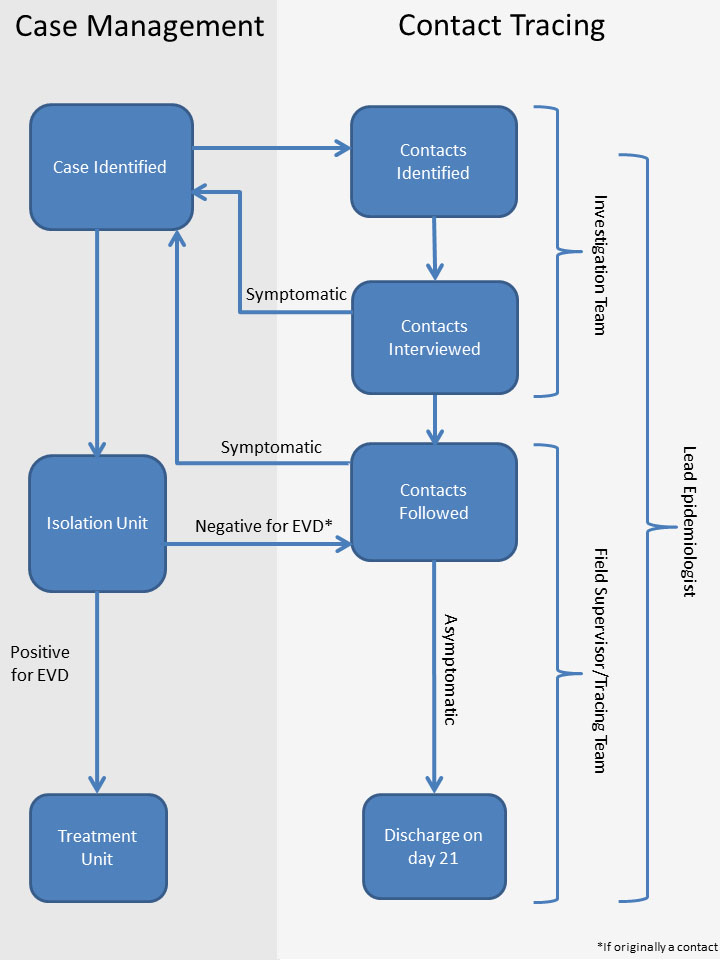CDC Supplements Ebola Assistance to Liberia, Sierra Leone, and Guinea by Preparing Neighboring Countries to Rapidly Detect and Contain Ebola
As of October 31, 2014, CDC has deployed 361 epidemiologists, public health analysts, communication specialists, and other staff to help control the spread of Ebola in heavily affected countries. In parallel effort, the Agency is shoring up defenses in countries that border Sierra Leone, Liberia, and Guinea. CDC’s International Task Force includes a team that focuses on countries that are at high risk for the introduction of Ebola, but have not yet reported cases or faced widespread disease. The goals of the Unaffected Countries Team include preventing Ebola from entering currently at-risk countries from Liberia, Sierra Leone, and Guinea and rapidly detecting, controlling and eliminating Ebola if and/or when it is introduced into a previously unaffected country.
CDC has identified 13 priority countries for assistance. The highest priorities are Guinea Bissau, Cote d’Ivoire, Senegal, Mali, and Ghana; based upon their proximity to countries with widespread disease and air traffic. Others on the list include Niger, Mali, Mauritania, Burkina Faso, Nigeria, Cameroon, Gambia, and Democratic Republic of Congo.
CDC’s strategic approach includes two parts. The first is to help at-risk countries strengthen their ability to rapidly detect cases of Ebola when/if they occur within their borders. The second is to enhance abilities to rapidly contain disease once/if it is detected.
The key to rapid detection is each country’s laboratory support. Adequate support includes timely access to appropriate laboratory testing and the technical knowledge and infrastructure to ship specimens. Currently six of the thirteen countries have the capacity to test or Ebola in their own laboratories: Nigeria, Ghana, Cote d’Ivoire, Mali, Senegal, and Cameroon. Others rely on arrangements with laboratories in other countries. At-risk countries also need adequate alert systems to identify suspect cases. CDC is assessing, with partners, health centers in at-risk countries’ districts on the border with Liberia, Guinea, and Sierra Leone and helping at-risk countries to develop standard approaches for assessing the adequacy of their alert system to identify suspect cases.
To rapidly contain Ebola countries need to strong incident management systems, including emergency operations centers and contact tracing plans. CDC’s “Ready Teams,” preparedness training, and Field Epidemiology Training Programs (FETP) are tools to assist countries with rapid response in case of the introduction of Ebola.

CDC Preparedness Training in At-Risk Countries includes this algorithm for case management and contact tracing.
Contact Tracing is the single most important “tool” for containing, and therefore eliminating, Ebola once is introduced into a previously unaffected country. As a result, the preparedness activities that CDC is conducting with at-risk countries build on the knowledge that contact tracing works. It has been used in each of the previous 20 Ebola outbreaks in the past 40 years to successfully control Ebola. Success stories from Nigeria and Senegal again demonstrate how comprehensive, intensive contract tracing is effective in the current outbreak. Recognizing the importance of contact tracing, the Unaffected Countries Team has created contract tracing guidelines, curriculum and training materials. CDC’s staff deployed to high-risk unaffected countries are providing these resources to ministries of health and other partners in-country.
Training for effective contract tracing is one part of a multi-pronged approach to prevent spread of disease into neighboring countries around Liberia, Sierra Leone, and Guinea. Other elements include assessment visits, preparedness workshops, and simulation exercises. In addition, a CDC epidemiology is being embedded in at-risk countries for a period of preparedness. Additional preparedness tools include assessment of laboratories, evaluation of alert systems, updating of country maps, simulations and exercises, and checklist of overall preparedness.
CDC’s country preparedness check lists and surveys help each country identify strengths and gaps in their surveillance systems, rapid response teams, health care system, diagnostic laboratory capacity, border and travel measures, health protection awareness, and emergency response management.
CDC is conducting activities in high priority at-risk countries in partnership with WHO-AFRO, USAID, International Association for National Public Health Institutes (ANPHI), Department of Defense, and CDC’s country offices and global health security activities.